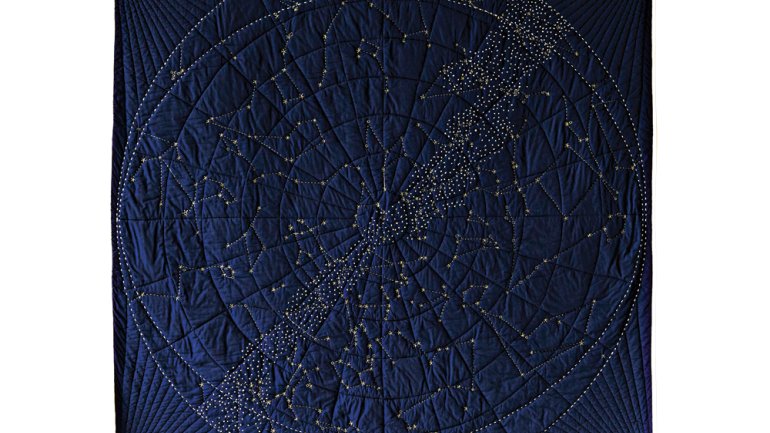Haptic Lab
Haptic Lab
“People move a lot now. We don’t stay put anymore. I can’t tell you how many apartments I’ve lived in since I’ve been in New York,” says Emily Fischer. The 36-year-old is the founder of Haptic Lab, a design firm based in Brooklyn, where she recently bought a townhouse. “I’m about to settle into a home for the first time in my adult life. I feel like it’s a real human need, to have that. People want to feel rooted, have a place – or at least remember one, have some kind of sentimental representation of place that they can take with them.”
If you can’t be in the place you love, you can wrap yourself in it, in the form of one of Haptic’s intricately stitched, geographically accurate quilts depicting street maps, coastlines, and constellations. Using GIS data, Fischer and her multidisciplinary team of designer-makers create and craft prototypes, which are hand-quilted through a partnership with a group of artisans in India. You can select from existing designs or custom-order your own location.
“People see the quilts and they’re like, ‘Wow, that’s the street I live on,’ or ‘There’s the walk I took on my first date with my future husband,’ ” says Fischer. “It’s been amazing to see how they respond. It’s so deeply personal.”
“Haptic” refers to the sense of touch, and the quilts tap into that need as well. In fact, it was her mother’s diagnosis of glaucoma and macular degeneration that inspired Fischer to begin making map quilts in her early 20s. “I realized as a designer that we privilege the visual so much. Because we experience design visually – and on our tablets and computers and phones now – we’re dissociated from the physical experience of it,” she says. These projects are almost like wayfinding tools, she says, a means of physically experiencing a place, even in the absence of sight.
That intersection of handwork and place has long been an interest for Fischer, who grew up sewing and quilting in rural Wisconsin. She studied theater set design in college, got her master’s in architecture at the University of Michigan, then worked in New York for a succession of architectural firms. After getting laid off in 2009, she recalls, “I started impulsively making stuff in a way that I hadn’t since grad school – quilts, kites, just every project idea I ever had.” Later that year she launched Haptic. “I made lots of mistakes,” she says of starting a company solo. “Long story short, I persevered.” (For more on her experience, see her candid article, “Ten Ways to Bootstrap a Sustainable Business.”
Making the leap from a solo to a collaborative practice has suited her, Fischer says, and allowed her to “keep iterating and pushing the designs forward.”
In addition to the quilts, Haptic has developed several other product lines, including fanciful ship kites crafted by a fair-trade group in Indonesia, and, lately, an experimental series of woven rugs with cloud imagery. You can even sew your own map quilt with a Haptic Lab DIY kit. It’s “a way to include more people in the projects,” Fischer says – “to not just build an audience for the work, but also create a community around the idea.”
Please Touch
Why Haptic Lab’s Emily Fischer loves New York: Tapping into the city’s huge, “super-connected” creative community helped her get her business off the ground. “I really believe if I lived somewhere else I’d just be a girl with a lot of weird hobbies.”
Places mapped in Haptic quilts: New York, Boston, San Francisco, London, Paris, Puget Sound, New Orleans, and the Great Lakes, to name a few. Custom orders are available.
The price tag: From $40 for a kite to $450 for a queen-size quilt. Fischer aims for affordability, so that “people can get together and buy a quilt for their friend’s wedding.”
From Brooklyn, with love: All products ship directly from the studio. “We don’t work with fulfillment centers. It’s important to me that I touch everything.”
Joyce Lovelace is American Craft’s contributing editor.




